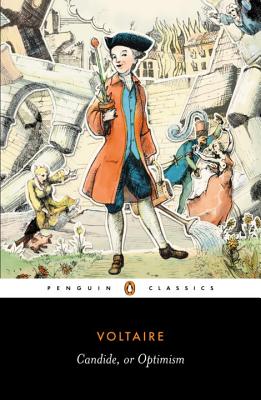CBR15 BINGO: Europe, because Voltaire, he is very French
It’s been so long since I read Candide that I can’t remember whether I was in high school or college at the time, yet the refrain, “Everything is for the best in the best of all possible worlds” has been stuck in my head like a 1980s Mountain Dew commercial. So when I was looking for a good candidate for the Europe BINGO category, I thought, “Why not revisit Voltaire?”
To sum up Candide, a young man of “true judgement with simplicity of spirit” grows up in the home of the Baron of Thunder-ten-Tronckh in Germany. This young man, named Candide, falls in love with the Baron’s daughter, the beautiful Cunégonde. The servants in the family suspected that Candide is the “son of the Baron’s sister,” which I’m pretty sure makes Candide and Cunégonde cousins, but this is the 18th century so we’ll let that go. When the Baron catches them kissing, he chases Candide from the castle “with great kicks on the backside.” Not because it’s gross that Candide and Cunégonde are cousins, but because Candide is not of high enough social status, and ya gotta have priorities!
From here, every character in the novel encounters a series of really unfortunate events, including conscription into the army, war, syphilis, slavery, hanging, disembowelment, rape, kidnapping, murder. The things that happen in this novel are downright bonkers. In a scene that has stayed with me even more than soft drink jingles, Candide sees two naked women being chased and nipped at by monkeys, so he plays the hero and shoots the beasts, only to have the young ladies dissolve in tears because the monkeys were their lovers. According to a 2008 Time Magazine article, Candide is (or was at the time) one of the American Library Association’s top ten most challenged works, but usually the cause of concern is blasphemy and sedition. What I wouldn’t give to attend a school board meeting where “monkey sex” is cited as the reason to ban this book.
In spite of all the misfortunes that fall the hero, he (mostly) maintains a positive outlook. His teacher, Dr. Pangloss, taught him optimism, and not just the “glass half full” kind of optimism. Pangloss espouses the philosophy of real-life Enlightenment philosopher Gottfried Leibniz, who coined that “everything is for the best” line. Leibniz believed that God created a perfect world, and anything that causes harm or misfortune must be part of the greater good. Pangloss takes this to comic lengths when explaining the principles to Candide. He states “. . .things cannot be otherwise than as they are; for all being created for an end, all is necessarily for the best end. Observe, that the nose has been formed to bear spectacles–thus we have spectacles. Legs are visibly designed for stockings–and we have stockings.” That’s rather backwards thinking, but eventually Pangloss takes it to extreme measures when real misfortune occurs. If someone drowns in an ocean, Pangloss will say the ocean exists for that individual to drown in.
As the story progresses, Candide starts to doubt, at one point even blurring out “Pangloss most cruelly deceived me when he said that everything in the world was for the best!” (Don’t worry, he recants 60 pages later when he learns that Cunégonde is alive and he’s going to see her again. Obviously all these misfortunes occurred so they could be reunited.) Finally, toward the end of the novel, a Dervish puts all the characters in their place by saying, “What signifies it whether there be evil or good? When his highness sends a ship to Egypt, does he trouble his head whether the mice on board are at their ease or not?” Translation: Y’all ain’t that important to God, so get over yourselves and stop trying to look for meaning when bad things happen.
There are some truly funny moments in this novel, such as when Candide bemoans, “Good God! I have killed my old master, my friend, my brother-in-law! I am the best natured creature in the world, and yet I have already killed three men, and of the three two were priests.” Nevertheless, it’s essentially one long, sarcastic joke, and I suspect most modern audiences won’t find themselves rolling on the floor laughing. As subversive literature goes, Candide is important to its time and so is worth reading at least once in your life (twice might have been pushing it).

